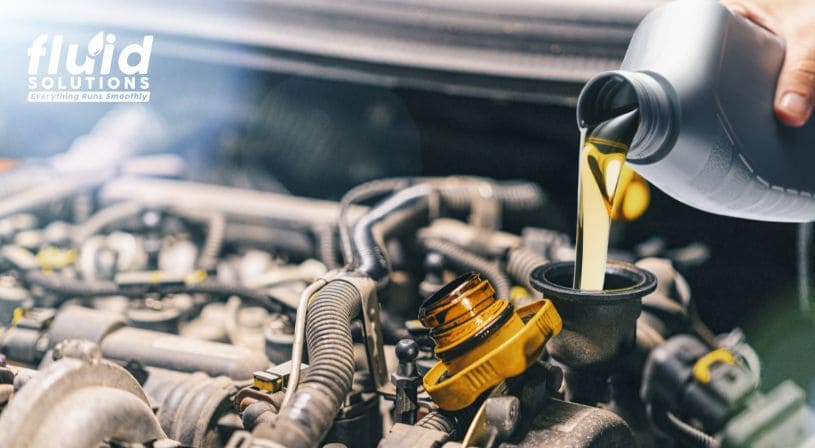
mage Source: https://rcphotostock.com/stock-photo/pouring-oil-to-car-engine-fresh-motor-oil-poured-during-an-oil-3277.html
The Importance of Engine Oil
Engine oil directly impacts the lifespan of vehicles, from passenger cars to heavy-duty trucks. Aside from lubricating the engine’s moving parts by reducing friction and wear, it also helps keep the engine clean, cool, and sealed. Regular maintenance, including timely engine oil replacement, helps maintain overall engine health. By prioritizing engine oil maintenance, vehicle owners can ensure their engines perform optimally and last longer, ultimately saving on repair costs and improving driving experiences.
Why Engine Oil Replacement is Essential
Engine oil plays many essential roles. Primarily, it serves the following purposes:
Lubrication and Protection
Engine oil serves primarily to lubricate the moving parts of the engine, reducing friction and wear. This lubrication is essential for preventing metal-to-metal contact, which can lead to severe damage and premature engine failure. By maintaining a protective film between components, oil helps ensure the engine operates smoothly and efficiently.
Cooling and Cleaning
Besides lubrication, engine oil also dissipates heat generated during combustion. This cooling effect is critical in preventing overheating, which can cause severe engine damage. Oil also acts as a cleaning agent, suspending accumulated dirt and contaminants. Regular oil changes remove these impurities, preventing sludge build-up that can clog engine passages and reduce efficiency.
Sealing
Engine oil also aids in sealing the gaps between engine components, which helps maintain compression and overall engine efficiency. This sealing function is vital for optimal engine performance, as it ensures that the combustion process occurs effectively.
Dangers of Failing to Change Engine Oil
Increased Engine Wear
Over time, oil breaks down and becomes contaminated with dirt, metal particles, and combustion byproducts. When oil is not replaced, it loses its effectiveness, leading to increased friction between engine components. This friction causes sped-up wear and tear, which can cause severe damage to critical parts, leading to costly repairs or engine failure.
Reduced Efficiency
As engine oil degrades, it can lead to reduced engine efficiency. Worn components, such as piston rings and valves, may not seal properly, allowing pressurized gases to escape during the combustion process. This loss of compression results in decreased horsepower and overall engine performance. Increased friction caused by heavily used oil can lead to higher fuel consumption as the engine works harder to overcome the resistance.
Decreased Engine Lifespan
The combination of increased wear, reduced efficiency, overheating, and sludge formation can significantly shorten the lifespan of an engine. Following your vehicle’s oil change frequency is a simple yet effective way to maintain engine health and ensure that the vehicle performs optimally.
How Often Should You Change Your Oil?

Image Source: https://www.istockphoto.com/search/2/imagefilm?phrase=oil+change+mechanic+smiling+motor+vehicle
Oil Change Frequency for Cars
Traditional Guidelines
In the past, it was commonly recommended to change your car’s oil every 5,000 kilometers or every three months, whichever comes first.
Modern Recommendations
However, with advances in oil chemistry and engine technology, most modern cars can now go much longer between oil changes. Many automakers recommend intervals of 12,000 to 16,000 kilometers, depending on driving habits and conditions.
Low-Mileage Vehicles
Even if you don’t drive your car very often, it’s still important to change the oil at least once a year to prevent the build-up of contaminants and ensure that the oil keeps its lubricating properties.
Oil Change Frequency for Trucks
Rule of Thumb
How often should I change synthetic oil in my truck? The general recommendation for truck engine oil change is every six months or roughly every 8,000 to 12,000 kilometers to ensure optimal engine performance. However, different oil types can also have different oil change frequencies. For instance, oil change intervals for synthetic oil are less frequent than regular ones.
Oil Types and Expected Lifespan
Different oils have varying lifespans, depending on their type. Below are the averages:
- Regular oil: Typically lasts around 8,000 kilometers
- Semi-synthetic oil: Lasts approximately 12,000 kilometers
- Fully synthetic oil: Can last up to 16,000 kilometers
Driving Conditions and Oil Degradation
Aside from the oil type, driving conditions also dictate truck oil change frequency.
- Increased Engine Load: When a truck carries a heavier payload, the engine gas to work harder to produce torque. This higher load generates more heat, which accelerates the breakdown of engine oil.
- City Driving: Trucks that primarily operate in urban environments experience cleaner conditions, allowing for longer oil life
- Off-road and Harsh Conditions: More frequent oil changes are necessary for trucks that operate in off-road or harsh conditions, as they are exposed to more dirt, debris, and challenging environments
Regular oil changes are essential for maintaining the health and performance of a vehicle’s engine. Following the recommended intervals and using high-quality engine oils help prevent costly repairs and ensure that a car or truck runs smoothly for years to come. Check your vehicle’s user manual for more detailed guidelines on oil change intervals.
Prevent Costly Repairs – Ensure Timely Oil Changes with Fluid Solutions
Fluid Solutions provides high-quality engine oil in the Philippines that offers fleet-friendly engine oils designed for every vehicle type.
For more information, you may check our catalog of automotive lubricants or contact us for our expert guidance in choosing the right engine oil and our servicing schedule. You may also reach us via our contact numbers at (02) 8370 5928 / (0917) 894 9156 or email your concerns to inquiry@fluidsolutions.com.ph.
Social Media Links:
Facebook Page: https://www.facebook.com/fluidsolutionsinc
LinkedIn: https://www.linkedin.com/company/fluid-solutions-inc


